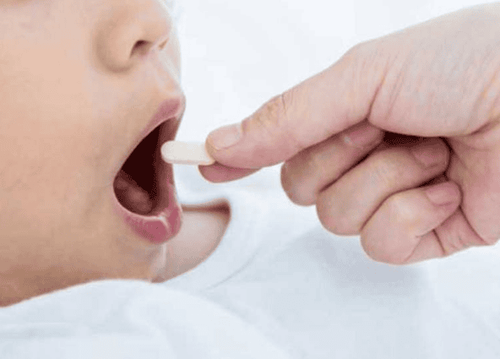This is an automatically translated article.
Taking deworming pills and remembering the regular deworming schedule will help you get rid of harmful parasites, help improve the digestive system and improve resistance. Let's find out useful information about deworming drugs such as: Why is it necessary to deworm? How long does it take to take the dewormer to go outside? Do you go out worms or not?
1. Why deworming?
Worms are parasites that enter the human body and live mainly in the intestinal tract, having the ability to survive and absorb nutrients at the host. Most helminth infections occur in humid tropical monsoon regions or developing countries due to high risk of contaminated food and drink.
In Vietnam, the most common intestinal worms in humans are roundworms, hookworms and whipworms. Children are also susceptible to pinworm infections. People infected with worms often suffer from digestive disorders, abdominal pain, malnutrition, anemia and many other health problems. Therefore, according to the recommendations of the Ministry of Health, people should take the initiative to take regular deworming drugs to protect the health of themselves and their families.
Currently, dewormers on the market work based on the following mechanism: destroy or paralyze worms attached to the body. Then cause the worms to push out in the feces or dissolve in the human body. This is exactly the purpose of using dewormers, towards the goal of eliminating worms from the body by any means.
2. Time to take medicine & symptoms after deworming
Current dewormers do not need to be taken after fasting or laxatives (enemas) as in the past. You can take the dewormer at any time of the day after eating, but it is best to take it 2 hours after dinner.
For children, parents should crush the tablet and mix it with water for easy drinking. To increase the effectiveness, when you take the drug should chew the tablet before taking it with water. After taking the medicine, you can completely eat and drink normally.
Note: Deworming drugs can cause some side effects such as nausea, dizziness, headache, digestive disorders, abdominal pain, transient diarrhea. However, you do not need to worry too much, because these symptoms are usually mild and go away on their own. In very rare cases, children can react to the medicine and have symptoms such as: rash, allergies, itching and hives.
3. How long after taking the dewormer will the worms die?
After taking the dewormer, the medicine will begin to be absorbed and take effect immediately, but it may take a few days for the drug to "infiltrate" and kill all the worms. In case you are prescribed deworming by your doctor, use the correct dose and use it for the time as directed.
Note: Albendazole and Mebendazole do not kill worm eggs, so be aware that you still have the risk of reinfection or transmission to others. Therefore, to ensure effective deworming and prevent recurrence, you should take an additional dose of the drug every 2 weeks.
4. How long does it take to take a dewormer to go outside? Does taking an anthelmintic go out of the worms?
Depending on the level of helminth infection, the time to go outside after taking the dewormer will not be the same in each person. When the drug enters the intestinal tract, it will be broken down and needs a certain time to weaken the worm. Usually, after 2 hours of deworming, many people will feel sad to have a bowel movement. However, there are also people who want to go outside for 2-3 days or have additional symptoms such as abdominal pain, frequent bowel movements. These are all side effects of enema and will disappear after 1-2 days, you do not need to worry too much.
Take an anti-worm medicine to get out the worms? As mentioned above, a few hours or days after taking the dewormer, you will feel the need to have a bowel movement (to have a bowel movement) to get rid of the worms in your stool. Previous dewormers remove dead or intact worms so you can see them in the stool. However, now all new drugs have a mechanism to make the worms dissolve in the stool, so you will not experience "worming out" anymore.
5. When to deworm? Contraindications
You will know you need to take an anthelmintic when you see the following signs:
Anorexia, decreased appetite; Or vomiting when waking up or abdominal pain above the navel, loose stools; Itching around the anus (especially at night); Tossing and turning, having trouble sleeping; Frequent drooling (drooling), teeth grinding a lot while sleeping; Itching, hives on hands, feet, buttocks that are repeated many times; Paleness, growth retardation, fatigue, poor concentration; Fever for several days, frequent cough, coughing up blood. And it should be noted that deworming is contraindicated for the following cases:
People with acute illness, fever over 38oC; People with some chronic diseases such as heart failure, liver failure, kidney failure, bronchial asthma; People with a history of allergy to the ingredients in the dewormer; Pregnant women in the first 3 months; Women who are breastfeeding; Children under 12 months old. The article has provided information you need to know about dewormers, how to take them properly. Hopefully, readers have answered some of the questions: "How long does it take to go outside? Did you go out to worms or not?". Do not forget to note the deworming date in the family calendar to remember the regular deworming schedule.
Please dial HOTLINE for more information or register for an appointment HERE. Download MyVinmec app to make appointments faster and to manage your bookings easily.













